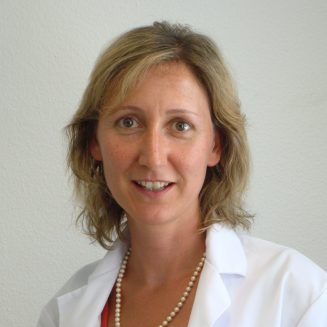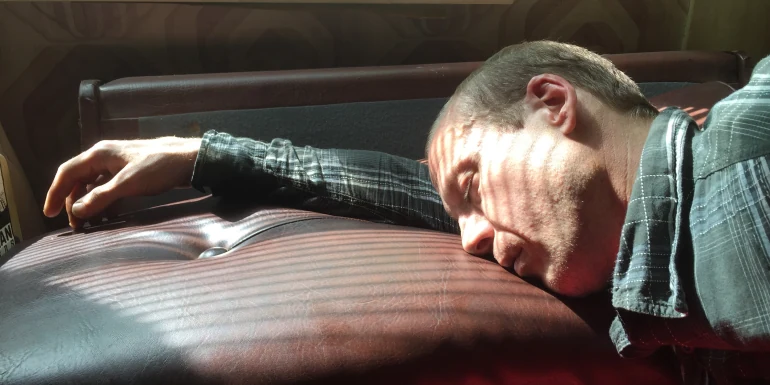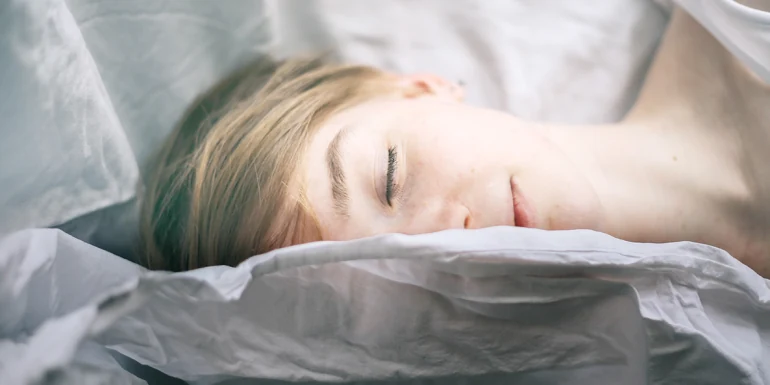
Snoring – what can be done?
Snore at night and feel weary in the morning? Or is your partner a nightly snorer? Even though snoring is mostly harmless, it is important to clarify the causes. How to proceed and tips for sufferers.
Snoring is an annoying evil. Depending on the intensity of the snoring, it can have a detrimental effect on the body’s essential recovery process – and sometimes it can be caused by a serious illness. Are you lethargic in the morning and sleepy and limited in what you can do during the day? Do you experience interruptions in your breathing during sleep? If so, have your snoring assessed in order to rule out sleep apnoea and prevent damage to your health. In the case of children, snoring should always be investigated.
There is no universal anti-snoring remedy. For the establishment of targeted treatment and therapy, an individual evaluation is required. Nevertheless, the risk of a bad night’s sleep can be reduced with a couple of simple household remedies and measures. You can usually stop the problem of snoring:
- Sleep on your side: make sure to sleep in a position that leaves your airways free. On your side is the best way. If you sleep on your back, your tongue can fall backwards and disturb your respiratory flow.
- Optimise your bed: seek advice from a specialist store in purchasing a supportive mattress with a slatted frame and a suitable pillow. Put the head end one handbreadth higher. Quick tip: two thick books under the bedposts do a better job than expensive anti-snoring pillows. The latter often cause a kink in the airways.
- Nasal irrigation: blocked nose? In case of a cold or allergy, nasal irrigation with a saline solution (stir ½ teaspoon of table salt into one cup of lukewarm water) also helps instead of nose drops. Important: make sure to get a chronically blocked nose checked out.
- Facial steam bath: pour one litre of boiling water (careful!) with three to five drops of tea tree oil or eucalyptus oil into a bowl, bend over it and breathe in the essential oil vapours for 10 minutes. A hand towel over your head and bowl ensure that the steam does not escape. Alternative: put a small bowl of water with 20 drops of eucalyptus oil on your bedside table.
- Gargle with peppermint oil: gargling helps to reduce swollen mucous membranes in the mouth and throat. Add two drops of peppermint oil to a glass of water.
- No alcohol in the evening: it makes the tissue in the throat soft and makes it easier for it to vibrate, which is easy to hear.
- Quit smoking: do you smoke? This often leads to snoring.
- Light dinner: try and eat things that are easily digestible in the evening. You will enjoy a more peaceful and relaxing sleep.
- Enough sport: a well-trained body and exercise outdoors improve our sleep. However, make sure not to train directly before going to bed.
- Carefully consider what medication you take: bear in mind that sleep remedies and other relaxing medicinal products can bring on snoring.
- Avoid overweight: excess fat tissue can worsen the bottlenecks in our airways. Read our tips in the blog article “Losing weight made easy”.
- Monitor the room climate: nasal mucous membranes enjoy a damp environment. A room temperature of 18 degrees Celsius and 40 to 60% humidity are ideal.
Causes of snoring
Our muscles relax when we sleep. This is also true for our upper airways. Everything becomes soft and lax, including our palate, uvula and tongue. This means that our airways become narrower. If the air we breathe in flows past such a bottleneck, the surrounding tissue vibrates, causing the typical noises we associate with snoring.
Snoring can have many reasons. Some of these can usually be avoided by leading a healthy lifestyle. The most frequent causes are as follows:
- Breathing through an open mouth rather than your nose; triggers for obstructed nasal respiration can include allergies, nasal polyps and congenital nasal constrictions.
- Anatomical causes: enlarged tonsils, large uvula, large tongue or jaw misalignments narrow the air flow. Enlarged tonsils are the most common cause of snoring among children.
- Excess weight – restricts the airways
- Sleeping on your back causing your tongue to fall backwards
- Medication, nicotine and alcohol
Sleep better thanks to Helsana Coach
If you sleep well and enough, you will have more energy. The tips and exercises in the Helsana Coach app will help you to sleep better. Download it now and start using it.
Harmless snoring or illness-related?
Most cases involve normal snoring, which is also referred to as primary snoring. From a medical perspective, this form is usually nothing to worry about. Nevertheless, it generates an annoying noise of up to 80 decibels – as loud as a lorry on the motorway. This disturbs our sleep, and especially that of our partner. Be wary if you suffer nightly interruptions in your breathing: this could be obstructive sleep apnoea.
The lack of oxygen due to the interruptions in your breathing increases the risk of cardiovascular illnesses, including heart attacks and strokes. Such sleeping disorders need to be looked at by medical sleep professionals. A consultation is also advisable for people who do not suspect that they suffer from sleep apnoea or interruptions in their breathing if they suffer from heavy snoring. Talk to your doctor. He or she can initiate the required examinations and, where necessary, refer patients for an outpatient consultation at a centre for sleep medicine or a sleep laboratory.
Stop snoring: which remedies help?
Online, you can find various therapies and anti-snoring aids ranging from anti-snoring pillows, anti-snoring mouthpieces, nose sprays and tongue pacemakers to turtle-like sleeping vests designed to prevent the wearer from sleeping on their back. The wealth of such aids alone shows that there is no quick universal solution for stopping snoring. Only after a precise diagnosis can treatment achieve this objective, be this in the form of snoring therapy or a surgical procedure for your nose or palate. Braces and mouthpieces should also be handled by professionals. These might be appropriate if a jaw misalignment is the reason you snore. You may otherwise find yourself spending unnecessary money on aids that have no effect on you.
Snoring less common among women
Snoring is widespread: one in every five men snores. Women are affected less frequently, except during pregnancy (due to their weight gain and preference for sleeping on their back). Men and women both snore more frequently with age: from age 60, some 60 per cent of men are affected and 40 per cent of women. This is because during menopause, the female body produces less oestrogen and the muscles along the airways become limp. In addition, the tissues become drier, allowing snoring to set in. Talk to your gynaecologist about this issue.
Snoring (ronchopathy) is the name given to noisy night-time breathing. A differentiation is made between primary or habitual and obstructive snoring, so-called sleep apnoea .

Daniela Janssen (lic. Phil. somnologist and psychotherapist FSP) is a member of the Specialist Somnology Team at the Zentrum für Schlafmedizin Hirslanden Zürich (centre of somnology). She advises adults, young people and children with sleeping disorders. As a psychotherapist, she also works in her own practice. Daniela Janssen was available to the editorial team in an advisory and editorial capacity for this article.


Newsletter
Find out more about current health issues every month and get all the information you need about our attractive offers from all Helsana Group companies * delivered by e-mail to read whenever it suits you. Our newsletter is free of charge and you can sign up here:
We did not receive your information. Please try again later.
* The Helsana Group comprises Helsana Insurance Company Ltd, Helsana Supplementary Insurances Ltd and Helsana Accidents Ltd.
